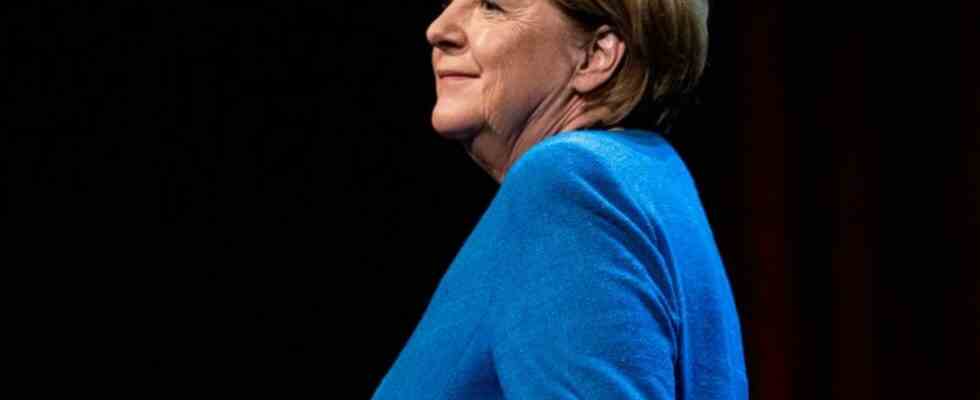interview
Ex-Chancellor Merkel: “I was pretty exhausted”
Angela Merkel was German Chancellor from 2005 to 2021. Photo: Fabian Sommer/dpa
© dpa-infocom GmbH
Months later, Angela Merkel gives her first long interview: She admits that her influence will dwindle towards the end of her term in office, but she doesn’t blame herself. As a private person, she now feels free.
In an interview, former Chancellor Angela Merkel spoke at length about her last few months in office and the current conflicts with Russia, while at the same time showing joy in her new role as a private individual.
“I was pretty exhausted,” said Merkel to journalists from the editorial network Germany (RND/Saturday). “Sometimes it’s still unusual that I no longer have deadline pressure.” But the advantages outweigh the disadvantages, she now feels “free”, emphasized the former chancellor. Ten days earlier, Merkel had answered questions from a journalist in the Berliner Ensemble for the first time after leaving the Chancellery.
Decision on Nord Stream 2
Merkel defended her decisions to build the Nord Stream 2 Baltic Sea gas pipeline to Russia. “I didn’t believe in change through trade, but in connection through trade, with the second largest nuclear power in the world,” said the CDU politician, who was Chancellor from 2005 to 2021. But it wasn’t an easy decision. “The thesis at the time was: If Nord Stream 2 is in operation, Putin will no longer deliver gas through Ukraine or even attack it.” However, the West ensured that gas was still routed through Ukraine. At that time, however, the German economy decided to transport gas from Russia because it was economically cheaper than obtaining liquefied gas from Arab countries or later also from the USA.
Merkel acknowledged that her influence over Kremlin chief Vladimir Putin was waning shortly before she left office. “It was clear that I would not be in office much longer, and so I simply have to state that various attempts over the past year have had no effect,” she said in the RND interview. Putin was no longer willing to hold a summit meeting in the so-called Normandy format with representatives of Russia, Ukraine, Germany and France. “On the other hand, I did not succeed in creating an additional European-Russian discussion format on a European security order alongside the Normandy format.” Russia then attacked neighboring Ukraine on February 24.
Merkel looks back on the refugee crisis
Looking back, Merkel emphasized that the “most emotional phase” in office was the refugee crisis. “2015/2016 was an extremely strenuous time, but I was very strong inside.” Her actions corresponded to the C on behalf of her party and to article one of the Basic Law. The C in the CDU stands for Christian. Article 1 of the Basic Law obliges us to protect human dignity and contains a commitment to human rights.
When many refugees, mainly Syrians, came to Germany via Hungary and Austria in late summer 2015, Merkel decided not to close the German borders. One of her best-known sentences was said at the time: “We can do it.” Merkel’s decision was controversial within the Union, but also in society.
Merkel has an East German background and grew up in East Germany. However, during her chancellorship she largely avoided making too much reference to it. But now she also wants to get to know western Germany better in her new phase of life. “I have seldom been in the old federal states without a purpose,” said the former chancellor. “I’ve never just been to the Loreley or the Moselle loop or alone in Trier Cathedral or Speyer Cathedral.”
Too little time during the chancellorship
During her chancellorship, there was simply not enough time for many concerns – even for the mourning of her mother, who died in April 2019 a few days before an EU summit, Merkel admitted. «That is part of the round-the-clock availability. When there is an EU Council, there is an EU Council. When it’s night session, it’s night session. If I’m not lying in bed with a fever at 40, I’ll just go to the EU Council.” That was her understanding of the office. But she also considered her political time of more than 30 years to be a great honor. She will now write a book with her longtime office manager Beate Baumann about her childhood and youth in the GDR.

